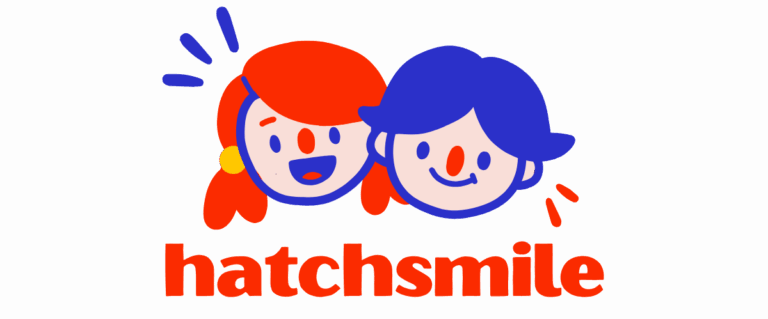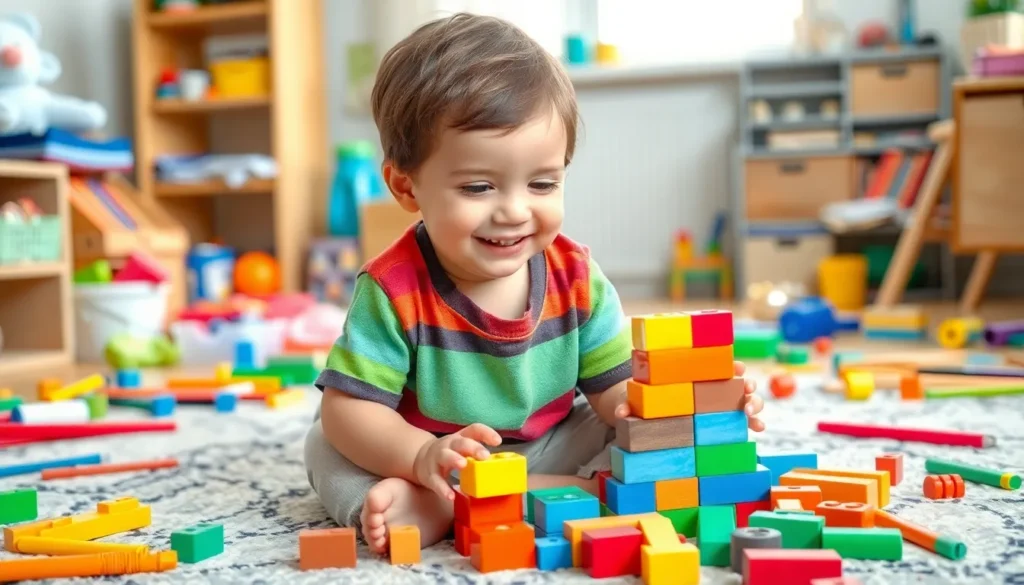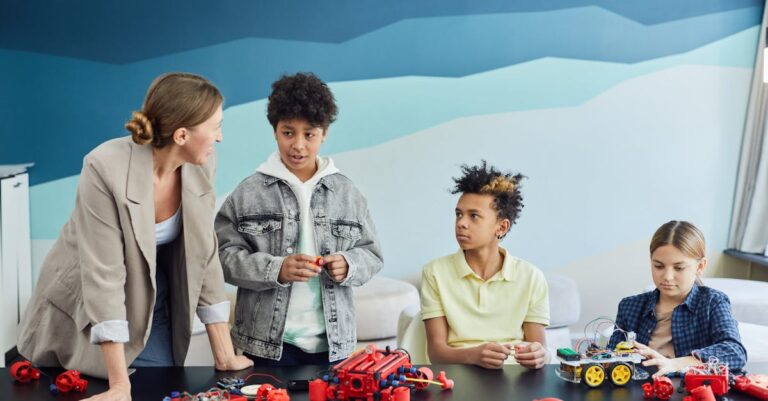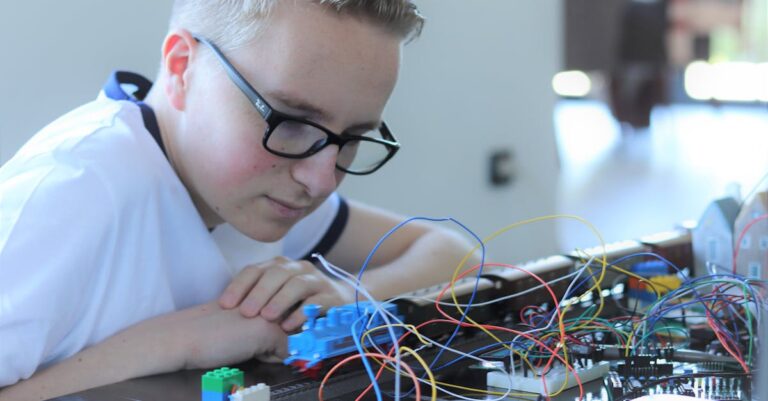Keeping toddlers entertained can feel like trying to catch a greased pig at a county fair. They’re bursting with energy and curiosity, ready to explore the world one tiny step at a time. But don’t worry—engaging activities can turn your home into a mini amusement park without the hefty ticket price.
Table of Contents
ToggleImportance Of Toddler Activities
Engaging in activities plays a crucial role in a toddler’s development. Physical activities enhance motor skills, coordination, and balance. Cognitive activities stimulate problem-solving and critical thinking skills. Socially engaging activities promote communication and teamwork among peers.
Toddlers thrive on exploration. When they participate in various activities, it encourages curiosity and boosts creativity. Structured playtime helps them learn routines and enhances their ability to follow instructions. Activities like painting and building blocks provide an outlet for self-expression and imagination.
Moreover, emotional development benefits greatly from these activities. When toddlers engage with others, it fosters empathy and understanding of emotions. Group activities allow them to navigate social dynamics and build friendships.
Additionally, activities tailored to individual interests can significantly boost confidence. When a toddler achieves a task, whether stacking blocks or completing a puzzle, it reinforces their self-esteem and motivation. Encouraging a variety of activities ensures a well-rounded development approach.
Nutrition also ties into activity engagement. Active toddlers often develop healthier lifestyle habits early on. As they learn the importance of movement, they are likely to carry these habits into later stages of life.
Incorporating music and rhythm-based activities can enhance auditory skills and memory retention. Exploring different sounds and rhythms encourages toddlers to enjoy learning through play. Meaningful interactions during these activities strengthen the parent-child bond.
Providing diverse experiences helps toddlers adapt to their environments. Each activity teaches them new skills and perspectives, paving the way for future learning opportunities. Prioritizing toddler activities creates a strong foundation for lifelong learning and personal growth.
Types Of Toddler Activities
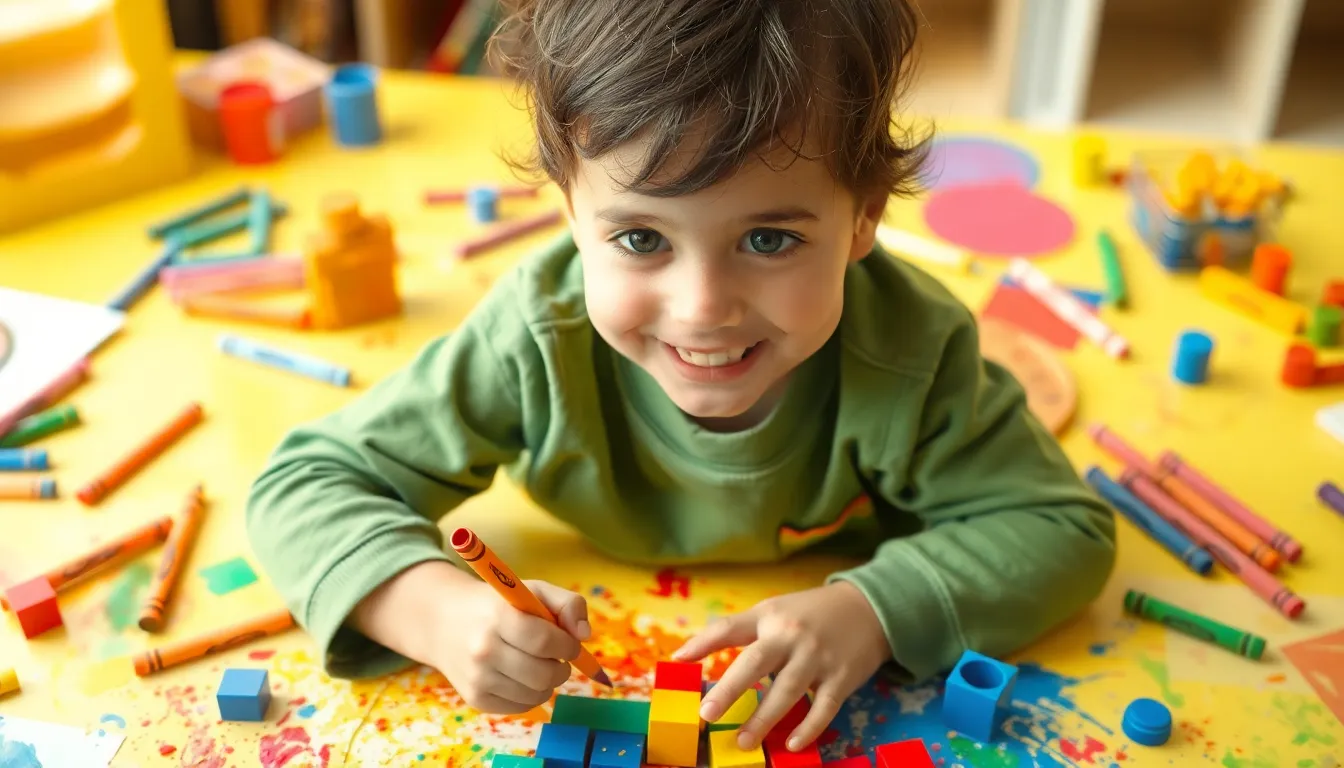
Various toddler activities enhance physical, cognitive, and emotional growth. Engaging in different types of activities helps stimulate curiosity and fosters development.
Indoor Activities
Creative play promotes imagination. Art projects like coloring or finger painting encourage self-expression. Building blocks help develop fine motor skills and spatial awareness. Simple puzzles stimulate problem-solving abilities and cognitive growth. Pretend play, such as playing house or doctor, enhances social skills and empathy. Movement-based activities like dancing or obstacle courses in the living room improve gross motor skills. Sensory bins filled with rice or beans offer tactile experiences that promote exploration. Each indoor activity complements another, creating a diverse learning environment.
Outdoor Activities
Outdoor adventures support physical fitness. Activities like running, jumping, and climbing develop strength and coordination. Nature walks encourage observation skills and appreciation for the environment. Playing with balls builds hand-eye coordination and teamwork skills. Gardening introduces basic science concepts and responsibilities. Bubbles inspire imaginative play while developing fine motor skills. Group games like tag boost social interaction and collaboration. Every outdoor activity contributes to overall development and instills a love for nature.
Developmental Benefits Of Toddler Activities
Engaging toddlers in various activities supports their overall growth. Parents and caregivers can choose activities that enhance multiple areas of development.
Physical Development
Movement-based activities like running and climbing build strength and coordination. Fine motor skills improve through activities such as drawing, stacking blocks, and using playdough. According to the American Academy of Pediatrics, active toddlers exhibit healthier lifestyle habits, aiding in long-term physical well-being. Gross motor skills further enhance through outdoor play, allowing toddlers to explore their environment. Engaging in these physical activities promotes balance and agility while keeping toddlers active and energized.
Cognitive Development
Cognitive growth occurs when toddlers participate in problem-solving games and creative play. Activities like puzzles, sorting games, and scaffolded questioning stimulate critical thinking. Research indicates that engaging toddlers in sensory activities enhances exploration and curiosity, leading to improved cognitive skills. Routines established through structured play encourage following instructions and completing tasks. Parents can foster this development by introducing age-appropriate, challenging tasks that keep toddlers mentally stimulated.
Social Skills Development
Social interactions thrive through group play, promoting communication and teamwork. Activities such as cooperative games and pretend play foster sharing and turn-taking. Engaging with peers helps toddlers understand empathy and social dynamics. According to the Zero to Three organization, these experiences are vital in developing conflict resolution skills. Encouraging collaborative play allows toddlers to build relationships and learn how to navigate social situations effectively.
Tips For Engaging Toddler Activities
Choose activities that match a toddler’s interests to enhance engagement. Arts and crafts foster creativity and fine motor skills. Encourage imaginative play with costumes or puppet shows, allowing toddlers to express themselves. Integrate sensory play using materials like rice or sand; these activities stimulate exploration.
Plan outdoor playtime to encourage physical activity. Nature walks promote observation skills, while climbing structures build strength. Running games develop coordination and social skills. Invite friends for group activities; teamwork instills cooperation and communication.
Use everyday materials for learning. Household items like boxes can transform into building supplies. Simple kitchen tasks, such as counting fruits or measuring ingredients, introduce mathematical concepts. Reading books together encourages language development and cognitive growth.
Set aside specific times for routine activities. Consistent schedules establish a sense of security. Incorporate music and rhythm into play; singing songs or dancing enhances auditory skills and promotes movement. Simple instruments like shakers or drums allow for creative expression through sound.
Encourage problem-solving during play. Puzzles and sorting games challenge cognitive abilities and boost critical thinking. Foster independence by letting toddlers tackle tasks on their own. Celebrate small achievements to build confidence and self-esteem.
Model positive behavior during activities, as toddlers often mimic actions. Engage in discussions about feelings and thoughts; this promotes emotional intelligence. Active participation from caregivers not only supports learning but also strengthens the parent-child bond.
Engaging toddlers in a variety of activities is essential for their growth and development. By creating an environment filled with stimulating experiences, parents can nurture their child’s curiosity and creativity. Whether through indoor crafts or outdoor adventures, each activity plays a crucial role in building motor skills, cognitive abilities, and social interactions.
Incorporating diverse experiences not only fosters emotional intelligence but also lays the groundwork for lifelong learning. As toddlers explore and play, they develop essential skills that will serve them well into the future. By prioritizing these activities, parents can ensure their little ones thrive in a fun and enriching atmosphere.
